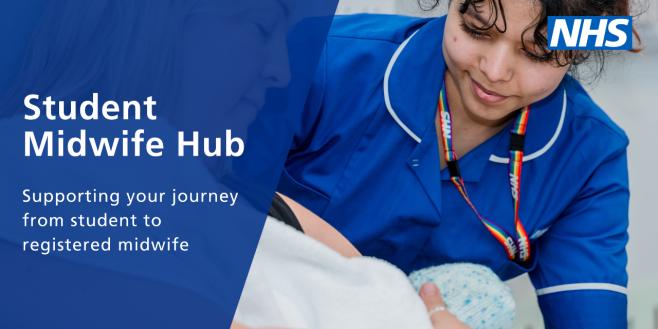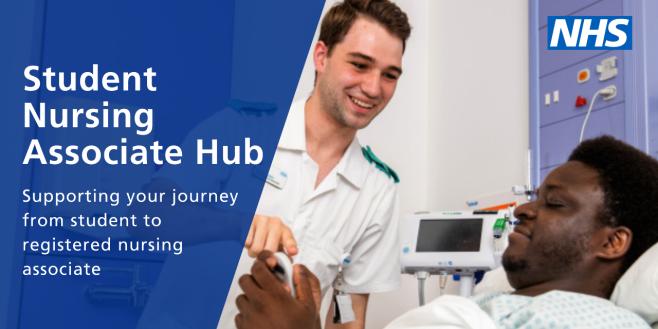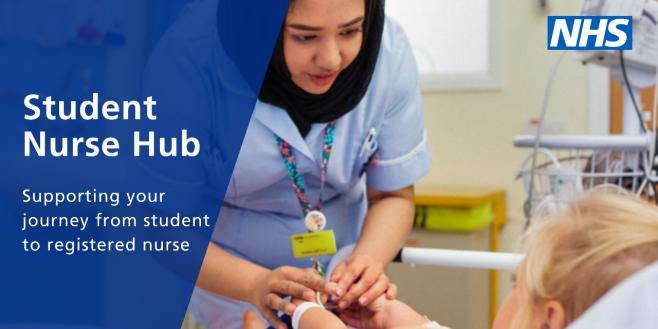You are here
Studying, placement support and resources for healthcare students
Top tips, guidance, resources and useful contacts for students.
Supporting your success throughout your healthcare studies
Whether you're on your nursing, midwifery or nursing associate education journey, this page provides essential resources to help you succeed in your academic studies and clinical placements. From study aids and professional resources to placement support and peer networks, we've gathered everything you need in one place.
Study aids and learning resources
Essential learning platforms
e-Learning for Healthcare – free online learning programmes covering various healthcare topics and specialties.
NHS Learning Hub – digital learning platform with resources for healthcare professionals and students across all career stages.
NHS Knowledge and Library Hub – access to thousands of healthcare resources, journals, and evidence-based information to support your professional studies and clinical practice.
Wiley – digital learning resources, textbooks, and interactive content for healthcare education and professional development.
Oxford University press healthcare education – comprehensive textbooks, online resources, and learning materials specifically designed for healthcare students.
OpenAthens NICE (registration needed) – access to NICE guidelines, evidence summaries, and clinical knowledge that underpins safe, effective healthcare practice.
BMJ Learning for Healthcare Education England – clinical learning modules, case studies, and continuing professional development resources.
e-Learning for Healthcare – free online learning programmes covering various healthcare topics and specialties.
NHS Learning Hub – digital learning platform with resources for healthcare professionals and students across all career stages.
Suggested studying tips
Plan ahead with a weekly schedule
- use a planner or digital calendar to block out:
- work shifts
- study sessions
- placement hours
- rest and personal time
- prioritise tasks using tools such as an Eisenhower Matrix (urgent vs. important) to focus on what matters most and avoid feeling overwhelmed by competing demands.
Break study into manageable chunks
- use the Pomodoro Technique – 25 minutes focused study followed by a 5-minute break. This helps maintain concentration and prevents mental fatigue
- break large topics into smaller goals – for example, 'revise anatomy of the heart' instead of 'study anatomy'. Smaller, specific goals feel more achievable and help track progress
Protect your wellbeing
- schedule downtime to avoid burnout. Healthcare training is intensive, and regular breaks are essential for maintaining your health and wellbeing
- practice mindfulness or light exercise to manage stress and maintain mental health throughout your studies
- do not skip meals or sleep - they're essential for memory consolidation and focus. Poor nutrition and sleep will undermine your study efforts
Communicate with your employer and tutors
- let them know your schedule and any challenges early – proactive communication helps avoid problems and shows professional maturity
- ask about flexible shifts or study leave if available. Many employers understand the demands of healthcare training and may offer support
- use support services like student wellbeing teams. These services exist to help you succeed
Use peer support
- form or join a study group with fellow trainees. Collaborative learning can help you understand difficult concepts and stay motivated
- share notes, quiz each other, and talk through difficult topics - explaining concepts to others reinforces your own understanding
- online forums or WhatsApp groups can help you stay connected with classmates and provide mutual support
Use the right tools
- organisation apps like Notion, Trello, or Google Calendar can help you stay organised and manage multiple commitments effectively
- study resources – use NHS Learning Hub or OpenAthens for trusted, evidence-based study materials rather than unreliable internet sources
Reflect regularly
- keep a learning journal to track progress and identify areas for improvement. Regular reflection helps consolidate learning
- reflect on what's working and adjust your routine as needed. Be flexible and willing to change your approach if something isn't working
Profession-specific study resources
For student midwives
Maternity and Infant Care Database (MIDIRS): e-Library for health – the world's largest midwifery database, cataloguing over 250,000 records from academic journals, government reports, websites and other sources relating to midwifery practice and research. This comprehensive e-Library ensures midwives and midwifery students can access virtually any written material, research or debate within their field through a single searchable platform.
Royal College of Midwives (RCM) iLearn – over 150 e-learning modules on midwifery topics available for RCM members.
For student nurses and nursing associates
Nursing-specific databases – access to nursing journals, care plans, and evidence-based practice resources through the NHS Knowledge and Library Hub
Clinical skills resources – video demonstrations, procedural guides, and competency frameworks to support your practical learning
National Education and Training Survey (NETS)
National Education and Training Survey – annual survey that gives healthcare learners the opportunity to provide feedback on their education and training experience. Your participation helps improve healthcare education for future students.
Why participate – your feedback directly influences how healthcare education is delivered and helps identify areas for improvement across the NHS.
When to complete – the survey runs annually typically in the Autumn, and all healthcare students are encouraged to participate.
Placement and university support
The Safe Learning Environment Charter for the NHS
High-quality placements help students become confident, skilled healthcare professionals. They also help more students complete their education and stay working in the NHS after they qualify.
The Safe Learning Environment Charter sets out 'what good looks like' for all healthcare learners in any healthcare setting. It was created after listening to over 2,000 students, educators and healthcare staff about what makes placements work well. Find out more about charter on the Safe Learning Environment Charter webpage.
Making the most of clinical placements
Preparation strategies – research your placement area, understand the patient population, and review relevant policies and procedures before starting.
Learning opportunities – actively engage with your practice supervisors and assessors, ask questions, and seek diverse learning experiences.
Professional development – use placements to develop both clinical skills and professional behaviours expected in healthcare practice.
Reflection and learning – keep a learning journal to track your development and prepare for academic assignments and assessments.
University support services
Most universities offer comprehensive support services for midwifery students, including academic support, student wellbeing services, disability support, and financial guidance. Contact your university's student services team to find out what specific support is available to help you succeed during your studies.
Support available for NHS students
We know working and learning in the NHS can be stressful. Looking after yourself helps you provide better patient care and get through your studies. Your wellbeing matters. The NHS has a range of support available to help you throughout your NHS career:
- 24/7 Text Support – Text SHOUT to 85258 for confidential support anytime
- free NHS Self-Check Tool - Find the right support option for your situation
- additional Support – We offer a range of health and wellbeing resources tailored to different needs
National Guardian's Office
The National Guardian's Office supports healthcare workers across the NHS and independent sectors, including students, in speaking up about patient safety and quality concerns. They provide guidance on raising concerns professionally and accessing support when needed.
Accessing regional support
Contact your university or local NHS trust to find out about regional student support networks in your area. Many regions also have dedicated student liaison officers who can provide additional guidance and support.
Professional body student support
The Nursing and Midwifery Council (NMC) provides comprehensive support for nursing, midwifery and nursing associates students throughout their education and into professional practice. Key support includes:
Education and registration
- guidance on approved nursing programmes and entry requirements
- step-by-step support for applying for your PIN (Personal Identification Number)
- information about character and health declarations
Student resources
- information about your rights and responsibilities as a student
- online resources and frequently asked questions
- contact details for registration queries and professional guidance
Professional standards
- the code: Professional standards of practice and behaviour for nurses
- guidance on professional conduct and ethical practice during training and beyond
Raising concerns
- guidance on how to raise concerns about patient safety or care standards
- support for students who need to speak up about issues during placements
- information about your professional duty to raise concerns and whistleblowing protection
For comprehensive information about all NMC support services, visit: NMC - Becoming a nurse, midwife or nursing associate.
Royal College of Midwives: Students – dedicated support for student midwives including:
- student membership benefits and discounts
- access to professional journals and resources
- student-specific events and networking opportunities
- career guidance and mentorship programmes
- advocacy on student issues and education policy
Other professional bodies – most healthcare professions have similar student sections within their professional organisations, offering networking, resources, and career support.
Peer support and networking
Nursing and Nursing Associate Social Care Student and Early Careers Network
Join this network which connects student and registered nurses and nursing associates passionate about or wanting to learn about social care. Benefit from peer support, career and professional development opportunities and networking with like-minded professionals across England.
Building your professional network
Social media groups – join professional social media groups for your healthcare profession but always follow your professional body guidelines about social media use.
University societies – participate in healthcare student societies and professional interest groups at your university.
Professional events – attend student conferences, study days, and professional meetings in your field.
Mentorship programmes – seek out formal or informal mentorship relationships with qualified professionals.
Study groups and collaborative learning
Peer study groups – form study groups with fellow students to share knowledge and support each other through challenging topics.
Inter-professional learning – engage with students from other healthcare professions to understand collaborative working.
Online communities – participate in reputable online forums and communities for healthcare students, while maintaining professional standards.
Wellbeing and self-care
Managing study stress
Healthcare education can be demanding both academically and emotionally. Resources for maintaining wellbeing include:
Time management – balancing academic work, clinical placements, and personal life requires good planning and organisation skills.
Stress management – learning healthy coping strategies for the pressures of healthcare education and future practice.
Work-life balance – maintaining relationships, hobbies, and interests outside of your healthcare studies.
Professional support services
Student counselling – most universities provide free counselling services for students experiencing personal or academic difficulties.
Occupational health – support for health-related issues that might affect your studies or fitness to practice.
Financial advice – guidance on managing finances during education and accessing available support funds.
Continuing your learning journey
Healthcare is a profession that requires lifelong learning. The study skills and resources you develop as a student will serve you throughout your career.
Developing critical thinking – learn to evaluate evidence, question practice, and contribute to improvements in healthcare.
Building research skills – understanding research methods and evidence-based practice principles that will inform your future clinical decisions.
Professional development planning – start thinking about your continuing professional development needs and career aspirations.
Use the resources on this Hub to support your learning journey and connect with the professional networks that will sustain your career development.


